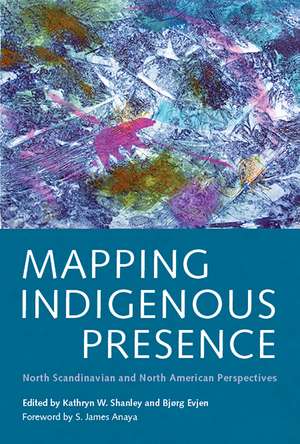Mapping Indigenous Presence: North Scandinavian and North American Perspectives: Critical Issues in Indigenous Studies
Editat de Kathryn W. Shanley, Bjørg Evjen Cuvânt înainte de S. James Anayaen Limba Engleză Paperback – 14 mai 2015
Despite centuries of colonization, many Indigenous peoples’ cultures remain distinct in their ancestral territories, even in today’s globalized world. Yet they exist often within countries that hardly recognize their existence. Struggles for political recognition and cultural respect have occurred historically and continue to challenge Native American nations in Montana and Sámi people of northern Scandinavia in their efforts to remain and thrive as who they are as Indigenous peoples. In some ways the Indigenous struggles on the two continents have been different, but in many other ways, they are similar.
Mapping Indigenous Presence presents a set of comparative Indigenous studies essays with contemporary perspectives, attesting to the importance of the roles Indigenous people have played as overseers of their own lands and resources, as creators of their own cultural richness, and as political entities capable of governing themselves. This interdisciplinary collection explores the Indigenous experience of Sámi peoples of Norway and Native Americans of Montana in their respective contexts—yet they are in many ways distinctly different within the body politic of their respective countries. Although they share similarities as Indigenous peoples within nation-states and inhabit somewhat similar geographies, their cultures and histories differ significantly.
Sámi people speak several languages, while Indigenous Montana is made up of twelve different tribes with at least ten distinctly different languages; both peoples struggle to keep their Indigenous languages vital. The political relationship between Sámi people and the mainstream Norwegian government and culture has historically been less contentious that that of the Indigenous peoples of Montana with the United States and with the state of Montana, yet the Sámi and the Natives of Montana have struggled against both the ideology and the subsequent assimilation policy of the savagery-versus-civilization model. The authors attempt to increase understanding of how these two sets of Indigenous peoples share important ontological roots and postcolonial legacies, and how research may be used for their own self-determination and future directions.
Mapping Indigenous Presence presents a set of comparative Indigenous studies essays with contemporary perspectives, attesting to the importance of the roles Indigenous people have played as overseers of their own lands and resources, as creators of their own cultural richness, and as political entities capable of governing themselves. This interdisciplinary collection explores the Indigenous experience of Sámi peoples of Norway and Native Americans of Montana in their respective contexts—yet they are in many ways distinctly different within the body politic of their respective countries. Although they share similarities as Indigenous peoples within nation-states and inhabit somewhat similar geographies, their cultures and histories differ significantly.
Sámi people speak several languages, while Indigenous Montana is made up of twelve different tribes with at least ten distinctly different languages; both peoples struggle to keep their Indigenous languages vital. The political relationship between Sámi people and the mainstream Norwegian government and culture has historically been less contentious that that of the Indigenous peoples of Montana with the United States and with the state of Montana, yet the Sámi and the Natives of Montana have struggled against both the ideology and the subsequent assimilation policy of the savagery-versus-civilization model. The authors attempt to increase understanding of how these two sets of Indigenous peoples share important ontological roots and postcolonial legacies, and how research may be used for their own self-determination and future directions.
Preț: 268.12 lei
Preț vechi: 331.52 lei
-19% Nou
Puncte Express: 402
Preț estimativ în valută:
51.30€ • 53.71$ • 42.45£
51.30€ • 53.71$ • 42.45£
Carte indisponibilă temporar
Doresc să fiu notificat când acest titlu va fi disponibil:
Se trimite...
Preluare comenzi: 021 569.72.76
Specificații
ISBN-13: 9780816531523
ISBN-10: 0816531528
Pagini: 312
Ilustrații: 4 maps
Dimensiuni: 152 x 229 x 28 mm
Greutate: 0.43 kg
Ediția:First Edition
Editura: University of Arizona Press
Colecția University of Arizona Press
Seria Critical Issues in Indigenous Studies
ISBN-10: 0816531528
Pagini: 312
Ilustrații: 4 maps
Dimensiuni: 152 x 229 x 28 mm
Greutate: 0.43 kg
Ediția:First Edition
Editura: University of Arizona Press
Colecția University of Arizona Press
Seria Critical Issues in Indigenous Studies
Notă biografică
Kathryn W. Shanley is a professor of Native American studies at the University of Montana–Missoula and has published widely in Native American literary studies, especially on the work of Blackfeet/Gros Ventre writer James Welch. Dr. Shanley served as president of the Native American Studies Association (2011–2013).
Bjørg Evjen is a professor at the University of Tromsø in Norway and has served as coordinator for its Master’s Programme in Indigenous Studies, Centre for Sámi Studies, from 2007 to 2014. Dr. Evjen’s research publications include Sámi history, the history of research, women’s history, polar history, industrial and labor history, and local history.
Bjørg Evjen is a professor at the University of Tromsø in Norway and has served as coordinator for its Master’s Programme in Indigenous Studies, Centre for Sámi Studies, from 2007 to 2014. Dr. Evjen’s research publications include Sámi history, the history of research, women’s history, polar history, industrial and labor history, and local history.
Descriere
Mapping Indigenous Presence promises to become a benchmark for future conversations concerning comparative Indigenous scholarly methodologies. Shanley and Evjen’s work attests to the importance of the roles Indigenous peoples have played as overseers of their own lands and resources and as political entities capable of governing themselves.











